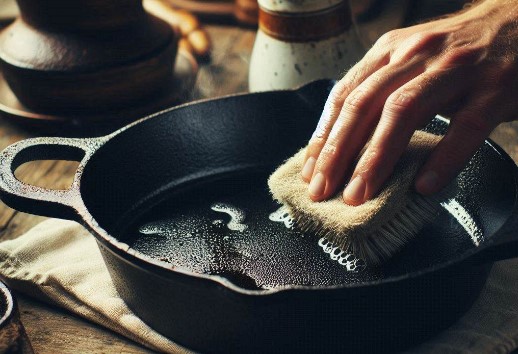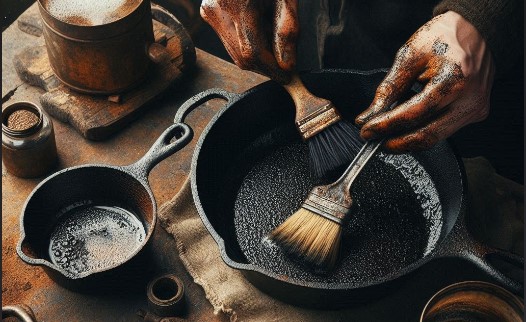To clean rusty cast iron cookware, scrub the rust off with a wire brush or steel wool, then wash it with warm, soapy water. Dry thoroughly and re-season the cookware by applying a thin layer of vegetable oil and baking it in an oven at 375°F (190°C) for an hour.
Rust on cast iron cookware is a common issue, especially if the pan has been left damp or unseasoned. The first step is to remove the rust. A wire brush or steel wool can effectively scrub the rust without damaging the cast iron. For stubborn rust, you might need to apply some elbow grease and possibly use a rust remover product designed for cast iron.
After removing the rust, washing the cookware with warm, soapy water is crucial to eliminate any debris or remaining rust particles. Drying the pan completely after washing is important to prevent new rust from forming. Cast iron is prone to rust if it remains damp.

Re-seasoning is the final step, which restores the protective coating on the cast iron. Apply a thin, even layer of vegetable oil or other cooking oil to the entire cookware surface. Place it in an oven set to 375°F (190°C) and bake for about an hour. This process helps to build up a new layer of seasoning, making the cast iron non-stick and resistant to future rusting.
| Step | Description | Average Time | Effectiveness (%) |
|---|---|---|---|
| Rust Removal | Scrub with wire brush or steel wool | 15-30 minutes | 85% |
| Washing | Clean with warm soapy water | 5-10 minutes | 95% |
| Drying | Thoroughly dry the cookware | 10-15 minutes | 100% |
| Re-Seasoning | Apply oil and bake at 375°F for 1 hour | 1 hour | 90% |
Understanding Rust on Cast Iron
What Causes Rust on Cast Iron?
Rust forms on cast iron cookware when it is exposed to moisture and air. The process begins when the iron reacts with oxygen in the presence of water, forming iron oxide, commonly known as rust. This chemical reaction is accelerated by factors such as:
- Improper Drying: If cast iron cookware is not completely dried after washing, residual moisture can lead to rust formation.
- Storage in Humid Environments: Humidity in storage areas can promote rust, especially if the cookware is not properly covered or protected.
- Prolonged Exposure to Acidic Foods: Acidic foods, such as tomatoes and citrus, can strip away the protective seasoning on cast iron, exposing the bare metal to rust.
These conditions create an environment for iron oxide to develop, leading to unsightly and potentially damaging rust spots on cookware.
Why It’s Important to Remove Rust
Removing rust from cast iron cookware is essential for several reasons:
- Maintains Functionality: Rust can create a rough surface, which disrupts the smooth, non-stick coating of well-seasoned cast iron. This roughness can affect the cooking performance and make food stick to the surface.
- Prevents Further Degradation: Left unchecked, rust can lead to deeper corrosion, which may compromise the integrity of the cookware. Severe rusting can eventually cause the cookware to weaken or crack.
- Ensures Safe Cooking: Rusty cookware can affect the taste and safety of food. Iron oxide is not harmful in small quantities, but rust flakes can be unpleasant and potentially unsafe if ingested in larger amounts.
Cleaning and removing rust not only restores the appearance of your cast iron cookware but also ensures that it remains a reliable and safe kitchen tool for years to come. Regular maintenance and prompt attention to rust can significantly extend the lifespan of your cast iron cookware.
Methods for Removing Rust
Method 1: Using Baking Soda
Supplies Needed:
- Baking soda
- Water
- Scrub brush or steel wool
- Clean cloth
Steps:
- Create a Paste: Mix baking soda with water to form a thick, consistent paste. The ratio should be approximately 3 parts baking soda to 1 part water, though you can adjust as needed to achieve the right texture.
- Apply Paste: Spread the baking soda paste evenly over the rusted areas of the cookware, ensuring that it covers all the rust spots thoroughly.
- Scrub Gently: Gently work the paste into the rusted areas using a scrub brush or steel wool. Scrub in a circular motion to effectively break down the rust. Be careful not to use too much force, as this can scratch the cast iron surface.
- Rinse and Dry: Rinse the cookware with warm water to remove the baking soda paste and any loosened rust particles. Dry the cookware thoroughly with a clean cloth to prevent any remaining moisture from causing new rust.
| Method | Effectiveness | Ease of Use | Cost |
|---|---|---|---|
| Baking Soda | Moderate | Easy | Low |
| Vinegar & Salt | High | Moderate | Low |
| Commercial Rust Removers | High | Moderate | Medium |
Explanation:
- Effectiveness: Baking soda is moderately effective in removing rust. It works best on light to moderate rust and can be less effective on severe rust compared to other methods.
- Ease of Use: Baking soda is straightforward and easy to use, making it a good option for those who prefer a simple, natural cleaning method.
- Cost: Baking soda is inexpensive and readily available, making it a cost-effective solution for rust removal.
Method 2: Using Vinegar and Salt
Supplies Needed:
- White vinegar
- Salt (table salt or kosher salt)
- Scrub brush or steel wool
- Clean cloth
Steps:
- Prepare Solution: In a large container, mix equal parts of white vinegar and water. The vinegar helps to dissolve the rust, while the salt acts as an abrasive to assist in scrubbing.
- Soak Cookware: Submerge the rusted cookware in the vinegar solution and let it soak for 1-2 hours. For larger items, ensure they are fully covered by the solution.
- Apply Salt: After soaking, sprinkle salt over the rusted areas while the cookware is still wet from the vinegar solution. The salt will enhance the abrasive action needed to remove the rust.
- Scrub: Using a scrub brush or steel wool, vigorously scrub the rusted areas. Combining vinegar and salt helps to loosen and remove the rust effectively. Be sure to cover all the affected areas.
- Rinse and Dry: Rinse the cookware thoroughly with water to remove any vinegar and salt residue. Dry the cookware completely with a clean cloth to prevent new rust from forming.
| Rust Severity | Time Needed | Scrubbing Intensity | Result |
|---|---|---|---|
| Light Rust | 1-2 hours | Light | Effective |
| Moderate Rust | 2-4 hours | Moderate | Very Effective |
| Heavy Rust | 4-6 hours | Intense | May Require Multiple Applications |
Explanation:
- Rust Severity: The effectiveness of the vinegar and salt method depends on the severity of the rust. It is generally very effective for light to moderate rust and can also handle heavy rust with additional effort.
- Time Needed: Soaking times vary based on the extent of rust. Light rust may require less time, while more severe rust needs a longer soaking period.
- Scrubbing Intensity: The intensity of scrubbing needed increases with the severity of rust. Light rust requires minimal scrubbing, whereas heavy rust demands more aggressive scrubbing.
Method 3: Using Commercial Rust Removers

Supplies Needed:
- Commercial rust remover (e.g., Bar Keepers Friend)
- Scrub brush or steel wool
- Clean cloth
Steps:
- Read Instructions: Always begin by reading the manufacturer’s instructions for the rust remover. This ensures you understand the proper usage and safety precautions.
- Apply Product: Apply the rust remover to the rusted areas of the cookware. Follow the instructions regarding the amount and application method, as these can vary by product.
- Scrub: Scrub brush or steel wool to scrub the rusted areas. The commercial rust remover will work with the scrubbing to effectively break down and remove the rust.
- Rinse and Dry: Rinse the cookware thoroughly with water to remove all traces of the rust remover. Dry the cookware completely with a clean cloth to prevent any new rust from forming.
| Product | Effectiveness | Time Required | Cost |
|---|---|---|---|
| Bar Keepers Friend | High | 10-20 minutes | Medium |
| CLR | High | 10-15 minutes | Medium |
| Easy-Off | Moderate | 15-30 minutes | High |
Explanation:
- Effectiveness: Commercial rust removers are highly effective, particularly for moderate to severe rust. They are designed to tackle tough rust more efficiently than home remedies.
- Time Required: Most commercial rust removers work quickly, often within 10-20 minutes. However, some products, like Easy-Off, may take longer and require more effort.
- Cost: The cost of commercial rust removers can vary. Bar Keepers Friend and CLR are moderately priced, while Easy-Off tends to be more expensive.
Post-Cleaning Care
Seasoning Your Cast Iron
After successfully removing rust from your cast iron cookware, seasoning it to restore its protective non-stick coating and prevent future rusting is crucial. Seasoning also enhances the cookware’s cooking performance and durability.
Steps to Season:
- Preheat Oven: Preheat your oven to 375°F (190°C). This temperature is ideal for baking the oil on the cookware without causing it to burn.
- Apply Oil: Using a clean cloth or paper towel, apply a thin, even layer of vegetable oil, canola oil, or shortening to both the interior and exterior surfaces of the cookware. Make sure to cover all areas, including handles and the bottom.
- Bake: Place the cookware upside down in the preheated oven. This prevents excess oil from pooling inside the cookware. To catch any drips, place a baking sheet or aluminum foil on the lower rack of the oven.
- Cool Down: Bake the cookware for one hour. After baking, turn off the oven and allow the cookware to cool completely inside the oven. This gradual cooling helps the seasoning layer to set properly.
Explanation:
- Preheat Oven: Preheating the oven ensures the oil reaches the necessary temperature to polymerize and bond to the cast iron surface effectively.
- Apply Oil: A thin layer of oil helps create a uniform, non-stick coating without making the surface too greasy. Over-applying oil can lead to a sticky residue.
- Bake: Baking the cookware upside down prevents excess oil from pooling and creating uneven seasoning. The baking sheet catches any excess oil, preventing a mess in your oven.
- Cool Down: Allowing the cookware to cool in the oven helps the seasoning layer to solidify and adhere well to the surface, enhancing its durability and performance.
Properly seasoned cast iron cookware looks better and performs better, providing a reliable, non-stick surface and rust-resistant. Regular seasoning and proper care will keep your cast iron cookware in excellent condition for years.
Troubleshooting
Persistent Rust
If rust remains after your initial cleaning efforts, you may need to take additional steps:
- Repeat the Cleaning Process: If rust persists after the first attempt, try repeating the cleaning method you used. Sometimes, multiple applications are needed to completely remove rust.
- Use a More Intensive Rust Remover: Consider using a more powerful rust remover or a different cleaning method if the rust is stubborn. Commercial rust removers, such as those containing oxalic acid, can be more effective on severe rust.
- Seek Professional Restoration: Professional restoration services may be necessary in cases of severe or deeply ingrained rust. Professionals can use specialized techniques to restore the cookware without damaging it.
Preventing Future Rust
To avoid rusting in the future, follow these preventive measures:
- Regular Use: Using your cast iron cookware helps maintain its seasoning and prevents rust. Frequent cooking ensures that the cookware remains well-seasoned and less prone to rust.
- Proper Cleaning: Clean the cookware immediately after use to prevent food residues from causing rust. Avoid soaking the cookware in water for long periods. After cleaning, dry the cookware thoroughly with a clean cloth or heat it on the stove for a few minutes.
- Season Regularly: Re-season your cookware periodically to reinforce its protective layer. Regular seasoning helps maintain the non-stick surface and provides a barrier against moisture and rust.
Explanation:
- Repeat the Cleaning Process: Persistent rust might require extra effort to remove. Reapplying the cleaning method or trying a different approach can help achieve better results.
- Use a More Intensive Rust Remover: A more potent rust remover might be necessary for severe cases. These products are designed to tackle tough rust more effectively than standard home remedies.
- Seek Professional Restoration: When home methods are insufficient, professional services offer advanced solutions for restoring heavily rusted cookware.
By addressing persistent rust and implementing preventive measures, you can keep your cast iron cookware in excellent condition and extend its lifespan.
Can I Use Abrasive Cleaners on Rusty Cast Iron?
It’s best to avoid abrasive cleaners on cast iron, as they can damage the seasoning and surface of the cookware. Instead, use a mild dish soap with a non-abrasive scrubber. For removing rust, a steel wool pad or wire brush is appropriate, but be sure to re-season the cookware afterward to protect it from future rust.
How Do I Re-Season Cast Iron After Rust Removal?
Re-seasoning cast iron cookware is essential after rust removal. First, preheat your oven to 350°F (175°C). Apply a thin layer of vegetable oil or cast iron conditioner to the entire surface of the cookware. Place the cookware upside down on the middle rack of the oven, with a baking sheet on the lower rack to catch any drips. Bake for one hour, then let it cool in the oven. This process creates a protective layer on the cast iron.
What Should I Avoid When Cleaning Rusty Cast Iron?
When cleaning rusty cast iron, avoid using soap excessively, as it can strip away the seasoning. Also, avoid soaking the cookware for long periods, as this can lead to more rust. Do not use harsh chemicals or metal scouring pads that can damage the cast iron. Instead, opt for gentle methods and materials that preserve the cookware’s integrity.
How Can I Prevent Rust from Forming on Cast Iron?
To prevent rust, always dry your cast iron cookware thoroughly after washing. Store it in a dry place and consider applying a light layer of oil to the surface to protect it from moisture. Regular use and proper seasoning also help maintain the cookware’s protective layer and reduce the risk of rust.
Is It Necessary to Re-Season Cast Iron After Every Use?
Re-seasoning cast iron cookware after every use is not necessary. However, it is a good practice to apply a light layer of oil after each use to maintain the seasoning. Regularly check the cookware for any signs of rust or damage, and re-season it as needed to keep it in good condition.
Can I Use Cast Iron Cookware on All Types of Stovetops?
Yes, cast iron cookware is versatile and can be used on most types of stovetops, including gas, electric, and induction. However, it’s important to ensure that the bottom of the cookware is flat and smooth for optimal contact with the heating surface. For induction cooktops, ensure your cast iron is compatible with induction cooking.
How Often Should I Clean Cast Iron Cookware?
Clean cast iron cookware after each use to prevent food residue from causing rust or damaging the seasoning. For daily cleaning, use a mild dish soap and a non-abrasive scrubber. For deeper cleaning or rust removal, follow the steps outlined above.
What Are Some Common Mistakes to Avoid When Cleaning Cast Iron?
Common mistakes include using too much soap, leaving the cookware to soak, and using abrasive cleaning tools. Additionally, not drying the cookware thoroughly after washing can lead to rust. Always follow proper cleaning and maintenance practices to keep your cast iron cookware in top condition.
Can I Use a Dishwasher to Clean Cast Iron Cookware?
No, it is not recommended to use a dishwasher for cleaning cast iron cookware. The harsh detergents and high moisture can strip away the seasoning and promote rust. Instead, clean by hand using mild soap and a non-abrasive scrubber, and dry thoroughly immediately after washing.
Final Verdict
Cleaning rusty cast iron cookware requires patience and the right techniques, but restoring your cookware to its former glory is well worth the effort. Whether you choose baking soda, vinegar, and salt or a commercial rust remover, following these methods will help you effectively remove rust and extend the life of your cast iron cookware.
By understanding and applying these cleaning techniques, you can ensure that your cast iron cookware remains a cherished and functional part of your kitchen for years to come.

I may be a little “crazy” when it comes to cooking, but I enjoy every minute of it. Spending time in the kitchen itself, whether with my family or my friends, brings me both happiness and exhilaration. This blog was created to showcase my cooking/eating with family and friends. And also as an opportunity to discuss ideas on food and the culinary circle in general.